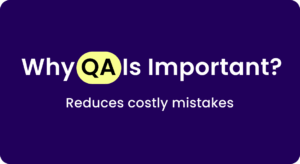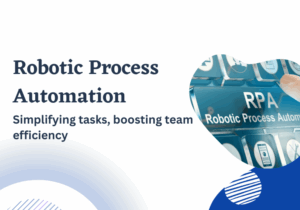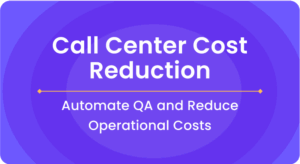Committing a mistake is fine as long as we learn from it and don’t repeat the same mistake again.
The same is true for sales.
Most often than not, we have seen that sales representatives are clueless as to why the prospects are not converting into customers.
That’s probably because the sales reps are committing the common sales mistakes again and again. Worse, they are unaware of their mistakes unless someone shows them upfront (like a conversation intelligence platform for sales teams).
Most salespeople make a very common mistake of not following up with questions and customer objections. Arguing with clients and asking irrelevant questions leads to poor customer service. Focusing too much on price often leads to the biggest sales mistake.
We have come up with a list of most common sales mistakes (and how to avoid them at all costs) that reps make while being on sales calls.
A. 20 most common sales mistakes
1.Not having good listening skills
When it comes to sales, it is largely seen that people have a bad habit of talking too much about their product or service.
When you harp your own horn, you won’t get enough time to know about the problems of the prospect.
That doesn’t mean you should go mum either.
The right balance is specific to your organization but experts believe that 60:40 (60 listening) is a good rule of the thumb.
As per a study, top sales reps allow prospects to speak 57% of the time(on average).
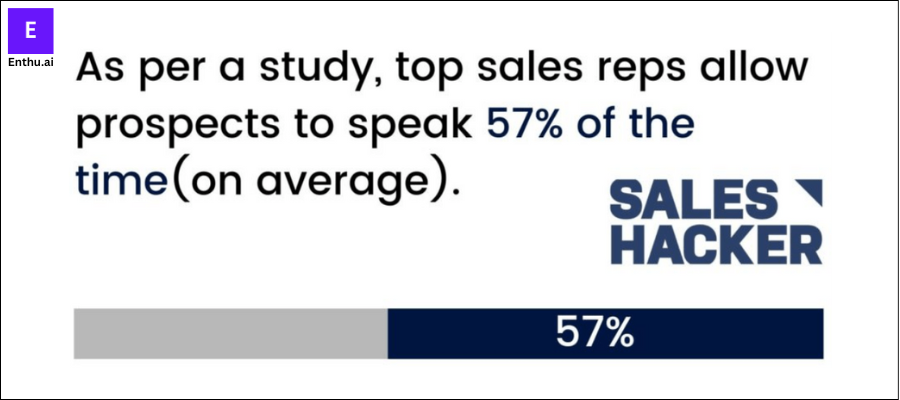
Most the successful sales reps focus on asking intelligent questions and then let their prospects do the talking.
These reps just keep directing the discussion with the right questions/inputs so that the prospect can move towards a sale.
That’s possible only because they know when to talk, and when to listen.
Here’s a great guide from Hubspot on Active listening in Sales.
Expert tip
Start monitoring calls, Listen to Talk Ratio (LTR) of your voice agents.
While there is no right or wrong number, speaking way more than the average or too little is clearly a red signal.
With Enthu.AI, you get LTR for all the calls, agents and the teams. That can help you identify benchmarks and vet your agents against deviations.
See Enthu.AI in action
2. Giving away too much information
When you talk too much, you tend to give extra information which is totally uncalled for and it actually might go against you.
There is no harm in providing information but it should be in limit. The prospects should do the hard work of getting the information and advice from you.
That happens by them taking interest in your product or service.
It is useless to provide too much access to information without getting anything in return.
So stay focused and reveal what’s required and what moves the prospect towards a sale.
Summarize points either manually or with the best AI summarizing tools and talk accordingly.
Remember your goal is to sell, not provide the prospect with unnecessary information
3. Not focusing on solutions
It is good that you talk about the amazing features that your product has. But do you actually think the prospect is interested in them?
I bet they are not.
Most of the customers do research before talking to a salesman.
At-least, they are aware of the features that your product (and the competitors) have to offer.
Before pitching anything do recall all the sales skills and focus on solving the problem of your audience, and pitch your product as a solution.
It’s easier said than done, so let me show you how we pitch Enthu.AI.
Instead of talking about the latest speech analytics or AI/ML technology that we are using to find call insights, we tell the sales leaders how call insights can help their team learn from their sales mistakes, improve performance and increase the sales revenue. These are the problems which a sales leader faces (and not the AI/ML model they should be using).
Speak about solutions and benefits; not the products & features.
Expert tip
Are your people selling benefits or just the features?
Enthu.AI can help you quickly figure that out.
You can define your custom calling themes and Enthu.AI will flag out the calls that didn’t mention solutions and benefits.
That can be a good starting point to listen to those calls/agents who are not talking about your product benefits.

4. Talking more on price than value
If your customer sees the value in your product, price generally takes the backseat. At least, it becomes the second important criteria, not the first one.
Contrary, if you think that price controls the sales narrative, then you are mistaken.
First, providing too much discount on your product or giving it away at low prices is only good for a short period of time.
Second, if your product has no value, then no one will take it even if given for free. But if it has value to offer then people will buy it even at high prices.
You need to drive the value proposition (at a given price), not the price proposition (for the given value).
Conversation intelligence solutions help you identify the sales pitch of your agents: is it value driven or price driven?
If the pitch is not aligned to the organization directives, sales leaders can take immediate corrective actions in form of agent coaching.
For example, see the screenshot below wherein you can define within Enthu.AI the moments where pricing is discussed in the call. That way, you will get a ready list of the calls where the pricing is talked about.

5. Making hollow promises
If your goal is only to sell without thinking about the customer, you will end up with overpromises.
But what happens when you are not able to deliver on the promises you have made?
You are considered a liar. Worse, the reputation of your company takes a beating.
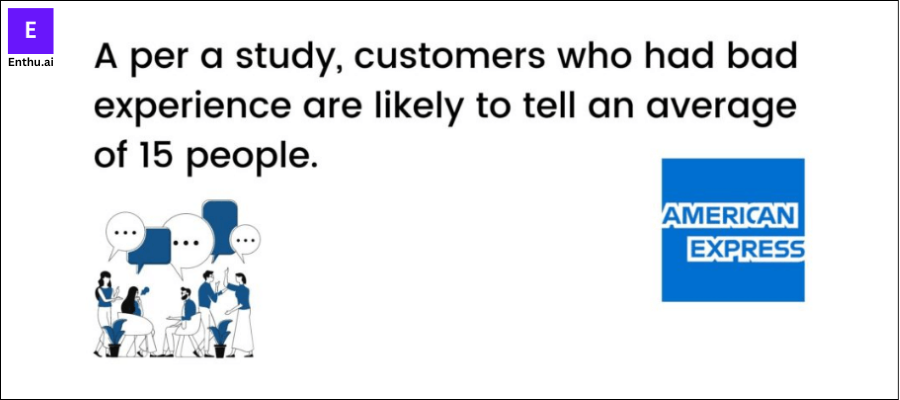
You must not exaggerate or hide any kind of information about your product.
Instead of making large unrealistic promises, you should under promise and over deliver.
It means when you provide them with more than what they have asked for, it will surely boost your reputation as well as the revenue. Beating expectations positively is what generates word of mouth.
Do the opposite and you have no one but yourself to blame.
6. No intention of closing a sale
Many times, sales reps focus more on their sales pitches and slideshows than the actual sales part.
It is because they want to show off in front of their colleagues, juniors and seniors about their oratory skills and sales craftsmanship.
This has to stop because you are not helping anyone including yourself.
The most important part of the sales process is to convert the prospect into a customer, and that’s where the focus should go. Obviously, the sales presentation and the design play their role, but the most important part is still the ‘good old’ solving the customer problem.
Additionally, you need to make it clear to the prospect that you are in the conversation to sell. You have to ask them to buy.
This is the easiest and straightforward way.
Don’t let the distractions sway you from your objective of the conversation.
7. Do not know how to handle objections
‘No’ is a word that most sales representatives hate. Every sales rep longs for his prospect to agree with him.
Unfortunately, that’s an unrealistic expectation.
So what should you do?
The first thing is not get disheartened when you are offered objections on your face.
Instead, consider that as an opportunity.
Psychologically, the value of ‘yes’ increases after saying ‘no’ too many times.
Consider an example of a car dealer. The car dealer will always keep the best car for last so that when you are saying ‘no’ to almost everything, a ‘yes’ at the end will come as a relief.
It is an art to handle objections in sales. You have to stay cool, show that you are open to their questions and understand the concerns they are having.
Also, you need to answer their questions honestly and clear any objections that they have.
After all that, if your prospect is still not convinced, then you might want to exit the sales process because the prospect may not be the right fit for or may not be in the buying stage.
Sales objections are one of the important components of sales that is bound to happen.
The prospect needs to make sure before they make a purchase, and it’s the duty of the salesperson to address all the questions and doubts.
Expert tip
As a sales leader, you should be aware of the most common objections that your agents hear day in and day out.
Thereafter, you can program the conversation AI software to filter out calls to listen to the objections and how the agents handle them within your organization.
If there’s an anomaly, agents can be trained for better objection handling.
Pricing and competition are two of the most commonly raised sales objections.
However, Enthu.AI can help you easily configure the system to capture those call moments.

8. Get into argue with a potential customer
It is very easy to get into arguments when your points do not match with your potential customers.
Sometimes a prospect is not able to see the actual picture and the objections raised by the person are unreasonable.
And when you try to correct them, you get into an argument.
Understand one thing clearly: you are representing an organization. There’s a way to deal with such situations, and the best way is often not to get into the argument at all.
So what should you do?
Stay silent or better empathize with their concerns. Ask questions to get more clarity into the matter and let them know that you might need some more time to resolve the objections .
At last, if you feel like you have hit a dead end with the prospect, end the conversation amicably and move on.
Just don’t argue to drive your point.
Remember, you can win a war by purposefully losing some battles.
9. Sales representative is under prepared
Being under prepared is a crime in sales.
Yet, 42% of the sales rep feel they don’t have enough information before they make a sales call (a survey by Lattice Engine reveals).
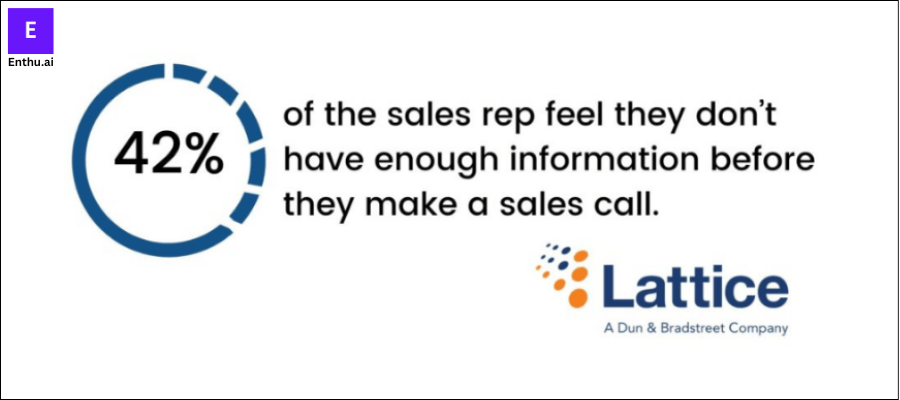
When you are selling something (especially the high value sales), you must know everything about the prospect.
Ok, not everything but most of the things.
That’s because your prospect is also researching you.
If you want to leave a good impression, do a thorough research. Get into your prospect’s shoes and understand the challenges in sales they may be facing each day. Identify the questions they may be asking when you finally talk to them.
All this research work helps you ask specific questions, dig at the right spots and provide solutions that solve the problem.
When you know about the prospect, personally or professionally, it shows your commitment and dedication towards work. That helps generate trust and respect.
This is extremely important because everyone wants to buy from someone whom they can trust.
10. Not able to talk to decision makers
The sales process, in which you cannot reach out to the executives who have the power to make purchase decisions, is useless.
You need to meet with the decision maker early in the sales process to make it a successful sale.
Because it will be more effective if you tell the benefits about your product and the important points of the deal directly to the decision maker.
Caveat: this doesn’t mean you shouldn’t talk to other parties involved. In the sales process, you will come across gatekeepers, influencers, product users and champions. Most of the time, these are the people who take you to the decision makers.
Your work is to identify such people, rather than wasting time on any random person.
11. Do not sell to someone who doesn’t need it
You must not sell your product to someone who doesn’t need it. Simply, your product is useless for him/her.
Most of such deals backfire.
Why?
Firstly, it will be a one time deal. The person will soon get into a buyer’s remorse and won’t make the transaction the next time.
Put your sales effort in creating long term relations with people who really need your solution.
Moreover, businesses prosper on repeat transactions done by the old customers.
Secondly, it is bad publicity.
The person who doesn’t need your product will see it as useless and also tell the same to the world.
And suddenly, you might start losing your old customers who get influenced by negative word of mouth.
12. Not asking the hard questions
Sometimes sales reps try to avoid asking the hard questions to the prospects.
It might be because they don’t have enough experience or they are not well prepared enough.
And when it happens you miss an opportunity to build rapport and trust with the clients.
As a sales person, you must always ask the hard questions like: “Why are you considering us after your long term relationship with our competitor?” , “What do you think about our price?” , “Are you comfortable with our company’s policies?”, etc.
Because when you do that you can understand the mindset of the prospect and also you will see yourself closing more deals than before.
13. Selling alone
Sometimes you might not have an answer to a question asked by the prospect.
At this point, you must not fly solo and always ask for help from other people in your company.
For example, a product manager will be able to explain better about the technicalities of the product.
So do not be ashamed of asking for help because it will improve your chances of closing the deal.
14. Agreeing to every term of customer
Saying ‘yes’ to every term put up by the prospect is not a good idea.
Because once you start on this journey, there is no coming back.
One after the other, there will be a series of demands made by the prospect and you might not see an end to it.
It will also continue after he/she becomes your customer and this will not only drain you financially but also mentally.
At the same time, this doesn’t mean you say ‘no’ to every request either.
Do a cost benefit analysis and take a decision. This activity will eventually lead to a happy and satisfied customer base.
15. Diverting attention to unimportant topics
In a sales process, it might happen that the sales reps go off the topic and start discussing something that is completely irrelevant to the sales.
This type of conversation should be avoided at all costs.
Your prospect is giving you his attention only for some period of time (which is generally quite short).
You need to put out your message in that short span of time.
If you are successful in delivering your message, you can talk about other things but only those that build your relationship with the prospect.
16. Not having a plan for follow-up
It is a rare chance when a prospect says yes to the deal after the first meeting. A deal closes only after several meetings/conversations.
It means you need to do a follow up if you want to close the deal.
As per a research by Marketing Donut, it takes at least 5 continuous follow ups after the initial sales contact, before a customer says yes.
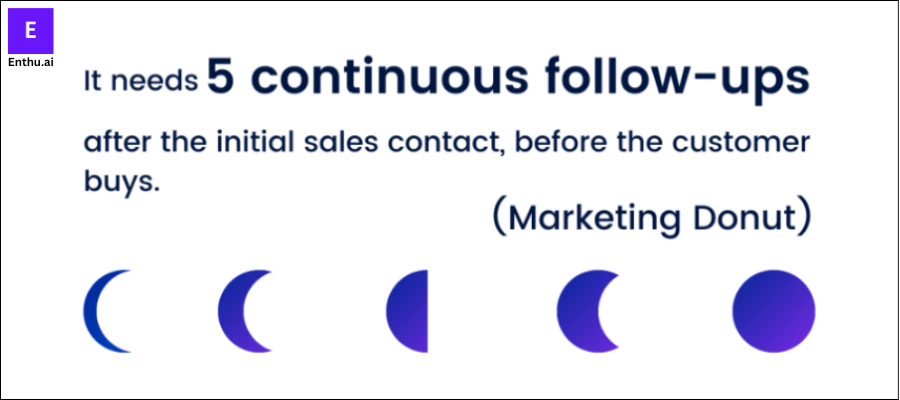
So have a follow up plan for your prospects.
17. Talking bad about the competition
It is quite common in the sales process that you talk about the differences between you and your competitors.
It is not a problem as long as your focus is on your product & solution, and not on the competitors’.
That means avoid bad mouthing your competitors. You need to draw out comparisons, yet keep the emotions aside.
Understand that the buyer is interested to know about your product, the benefits it provides and if you take that away from the prospect, he will lose interest and the deal will never succeed.
Remember that the sales process is about your product and nothing else.
18. Talking after closing a deal
Once you close the deal successfully, you just need to say thank you.
Don’t utter a word beyond that because if you do, then it might cost you the deal.
It happens a lot of times when after closing the deal, the sales rep (in their state of happiness) says something that is not taken in the right spirit by the other party.
As a result, the client will say a final goodbye to you and the deal.
Learn to shut your mouth up after someone agrees to be your customer. Worse, let them become your customer before you open up further.
19. Not appropriate body language and too many filler words
You must be careful about how you project yourself in front of the prospects.
Filler words are quite human and most of us tend to use them, but an overuse might turn off some prospects.
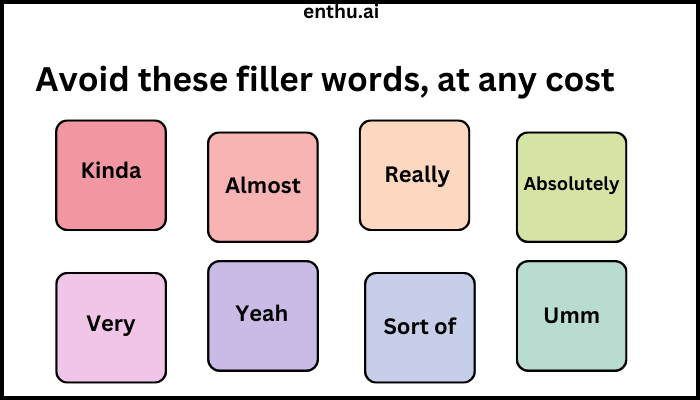
For example, when you use words like ‘umm’, ‘you know’, or ‘the thing is’, or when you avoid eye contact or when your shoulders are down, etc, all these things might show that you are under prepared, bored or uninterested.
This definitely impacts the sales outcome.
20. Do not let prospects control the narrative of the sales
At times, prospects might say that he will get back to you in a week or so for he has to discuss your product with someone important or do a thorough analysis about your product.
But never allow this to happen because that’s the most common way to pass the call.
Instead, take control of the narrative and request the prospect to fix a meeting for next week now itself.
Most of the time they agree and if they do not, you know the prospect is still not ready for a sale.
Conclusion
As a sales leader, it’s your responsibility to coach the sales reps in the right direction. For that you need to catch their mistakes well within time, before the damage gets done.
While you can’t monitor 100% of the conversations within your sales team, Enthu’s conversation intelligence capabilities can.
Enthu’s artificial intelligence algorithms analyse every single sales call that happens in a team, and surfaces the sales mistakes within a couple of seconds.
That means not just better QA but also better rep coaching resulting in improved performance.
After all, there is a direct correlation between the sales mistakes & the revenue performance.
Which are the most common sales mistakes you see reps making day in and day out?
FAQs
1. What are the 4 common sales mistakes?
Common sales mistakes include speaking too much, giving extra information, ignoring the main problem, talking more on price than value, making hollow promises, arguing and many more.
2. What is one of the biggest mistakes sales rep make while selling?
One of the biggest sales mistake reps make is focusing too much on their product or service, and speaking a lot rather than understanding and listening to the customer’s needs.
3. What are the common problems in sales?
Common problems in sales include difficulty in generating leads, failure to close deals, lack of effective communication with prospects, and failure to differentiate from competitors.



 On this page
On this page
